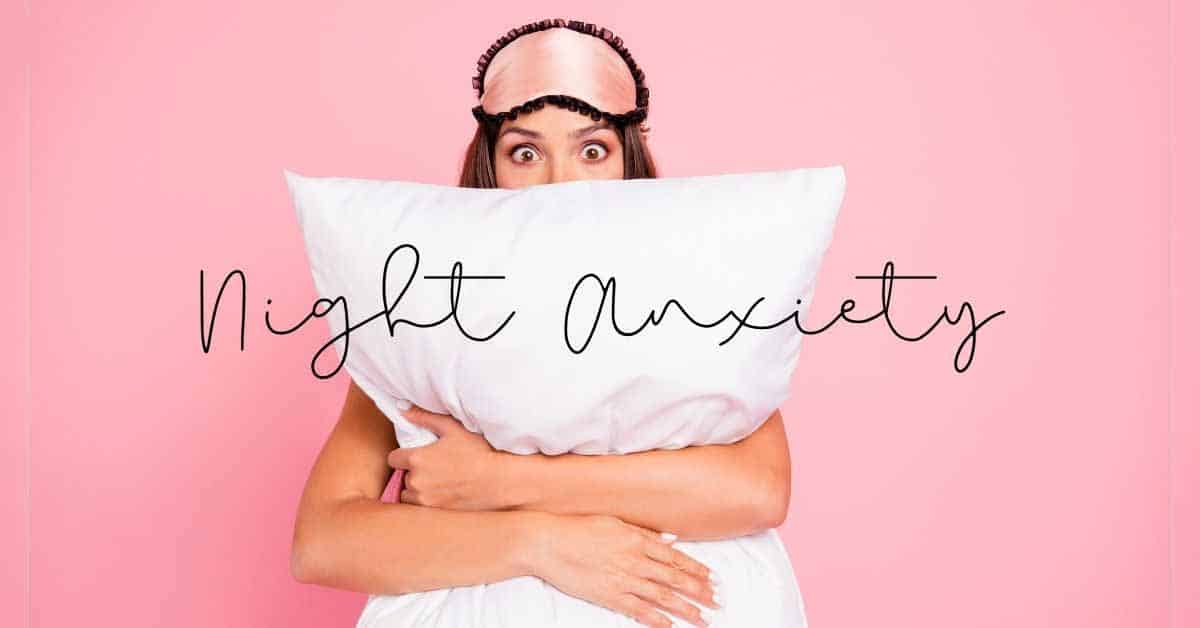Home > Emotional wellbeing > Mental health > Trouble Sleeping? Night Anxiety and Nocturnal Panic Attacks


We’re all aware of the many links that have been drawn between our mental health and our sleep schedules. Suffering from poor sleep can make matters worse and struggling from mental health can make falling asleep or sleeping too long a difficulty. Night anxiety is a common occurrence.
I remember a few years ago I used to get hugely anxious at night, and for no reason that I can remember. It was bad. I felt sick, shaky and scared. I used to take herbal sleep tablets, drink hot milk or chamomile tea, but nothing seemed to work. I ended up in a sort of cycle, where knowing that I would get anxious made me anxious in advance. I hated the evenings and going to bed. It’s one of the first times I can really clearly pinpoint having a panic attack. I’ve even woken up from having a panic attack whilst sleeping, and I’m not the only one.
At night, we are often alone with our thoughts. We aren’t doing anything that can distract from intrusive thoughts or memories. There are many things that cause anxiety, and sometimes it just is there for no reason at all. For a lot of us, it’s the stress of work or day to day life, but when I struggled with this night anxiety, I was a child. A tween, if you will. So, there wasn’t that much in my everyday life to spiral me into panic attacks during the summer holidays other than maybe the house was a bit spooky.
Our brains don’t ‘turn off’ when we sleep. They keep going, allowing any stresses or worries to manifest unconsciously. This is why we can suffer from anxiety even when we’re already asleep.
“I find the nights long, for I sleep but little, and think much.” – Charles Dickens, Bleak House
Sometimes referred to as ‘night terrors’, nocturnal panic attacks are more common than you might think. As with panic attacks during the day, these can be triggered or not and generally feature the same symptoms, including:
If you’ve had panic attacks before, there may be other symptoms you’re familiar with. We end up in the cycle mentioned before. After having one panic attack, you live in fear of it happening again, this build up of stress and anxiety is often what eventually triggers it. All in all, a bad night’s sleep.
“He who fears he shall suffer already suffers what he fears.” – Michael de Montaigne
Not getting a good night’s sleep can have negative consequences both physically and mentally, as well as in the short and long runs including:
There are many ways to relax your body and mind before settling down to make sure get a good night sleep.
When you wake up from a nocturnal panic attack, settling down again can be difficult. If need be, get up and walk around for a bit. Get some fresh air from your window or garden, drink some tea and lower your heart rate and breathing before trying to nod off again.

-


Dr Singh is the Medical Director of the Indiana Sleep Center. His research and clinical practice focuses on the myriad of sleep.

Understanding the female libido Before we can answer, “Does progesterone increase sex drive?” it’s important to gain a better understanding of what a “sex drive” means. The female libido or sex drive is how much you desire sexual activity. Every

Why am I so hungry before my period? Women who experience an increased appetite before period starts can feel frustrated that they’re craving foods they don’t normally eat. You may be wondering, “Why do I eat so much before my

Understanding cycle syncing workouts Did you know that evidence shows a link between the impact of exercise and menstrual cycle phases in women? It’s true. Women are at a higher risk of foot and ankle injury during workouts than men,
Hormona© 2025, All Rights Reserved
Privacy Overview
| Cookie | Duration | Description |
|---|---|---|
| cookielawinfo-checkbox-analytics | 11 months | This cookie is set by GDPR Cookie Consent plugin. The cookie is used to store the user consent for the cookies in the category "Analytics". |
| cookielawinfo-checkbox-functional | 11 months | The cookie is set by GDPR cookie consent to record the user consent for the cookies in the category "Functional". |
| cookielawinfo-checkbox-necessary | 11 months | This cookie is set by GDPR Cookie Consent plugin. The cookies is used to store the user consent for the cookies in the category "Necessary". |
| cookielawinfo-checkbox-others | 11 months | This cookie is set by GDPR Cookie Consent plugin. The cookie is used to store the user consent for the cookies in the category "Other. |
| cookielawinfo-checkbox-performance | 11 months | This cookie is set by GDPR Cookie Consent plugin. The cookie is used to store the user consent for the cookies in the category "Performance". |
| viewed_cookie_policy | 11 months | The cookie is set by the GDPR Cookie Consent plugin and is used to store whether or not user has consented to the use of cookies. It does not store any personal data. |
